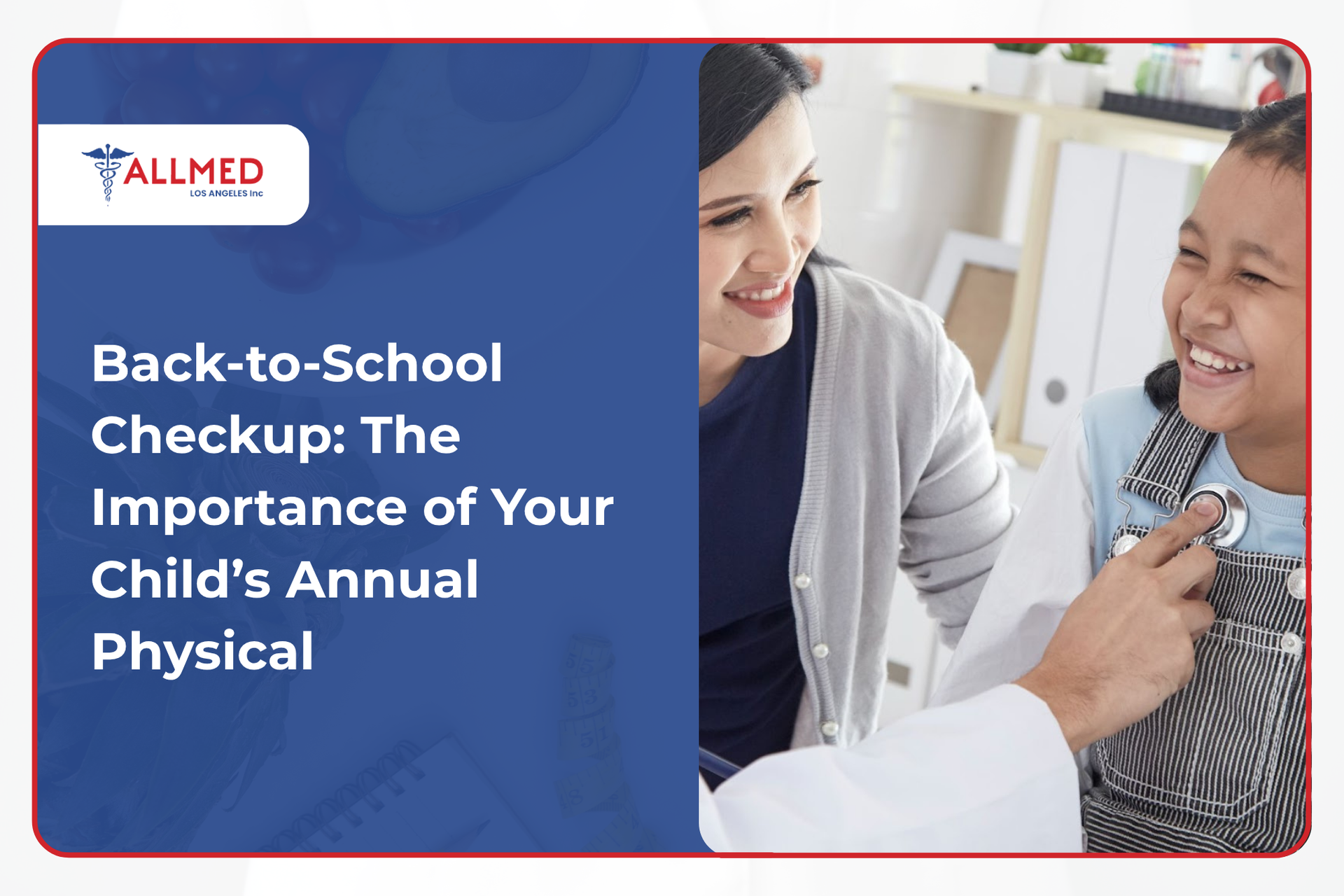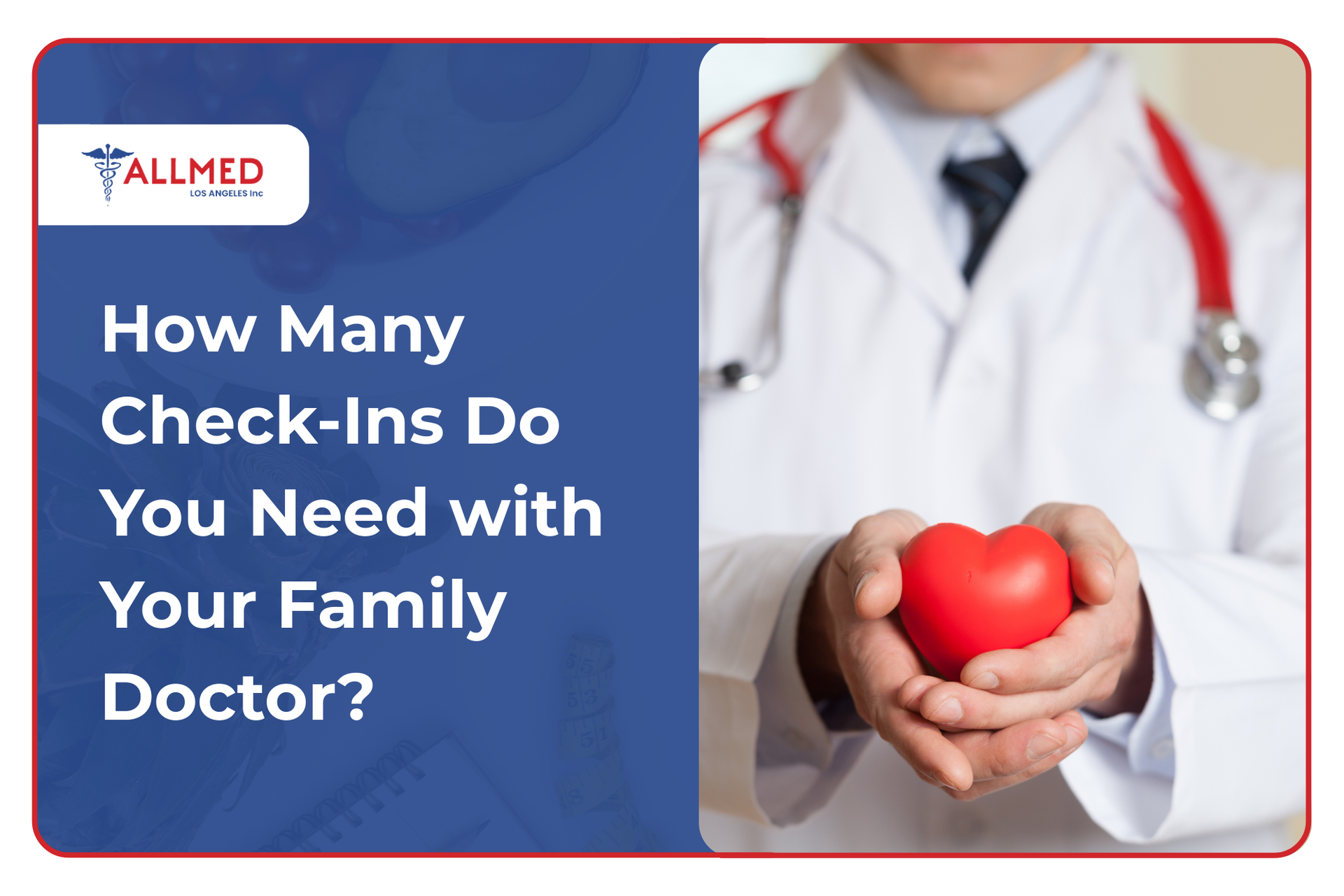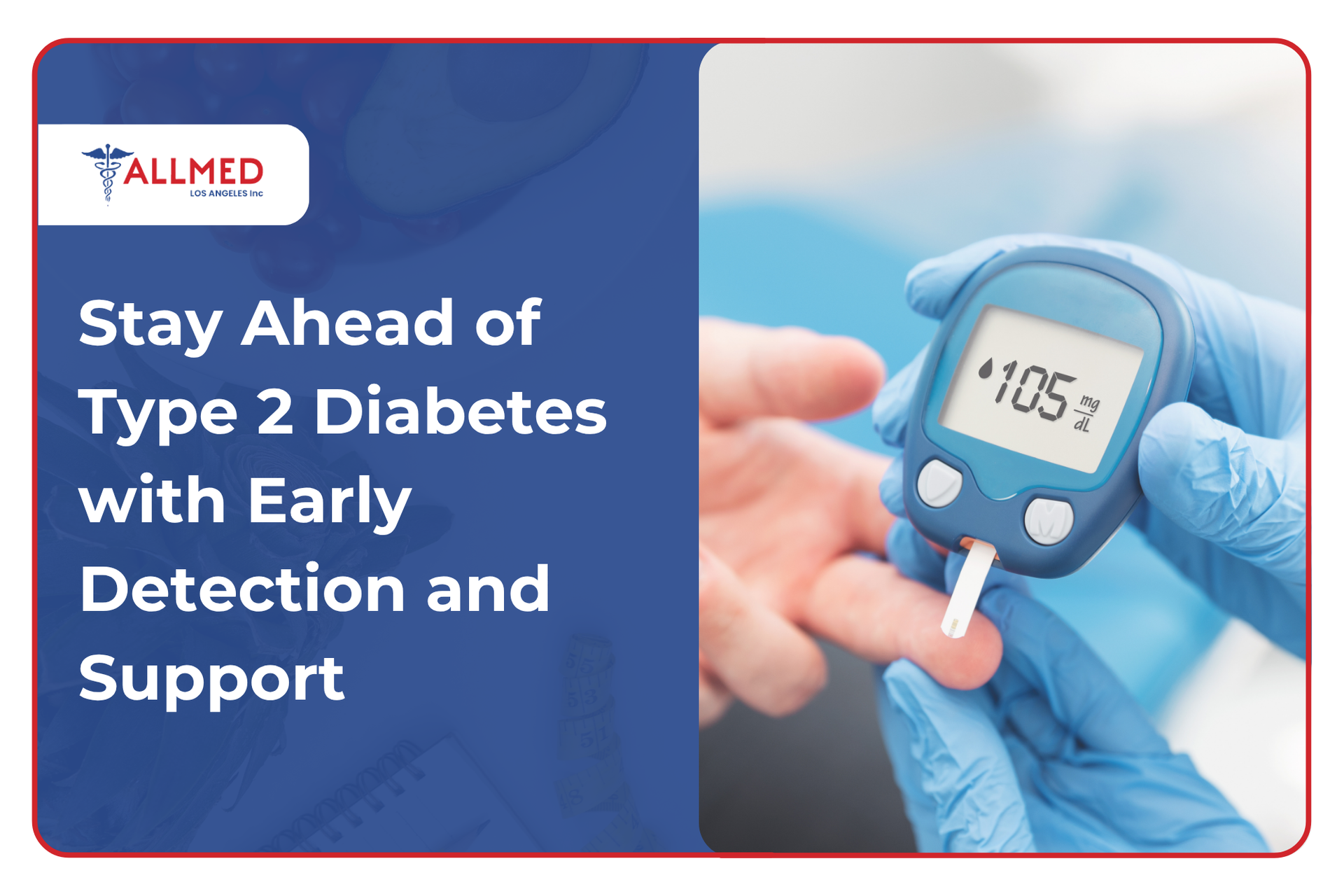And just like that, summer vacation is almost over! Sleeping in is back to “weekends only,” and before long, daily alarms are making a comeback. It’s usually a good time for your child’s shopping list of school essentials—and an even better time to book a school physical for the new academic year.
Your child’s school likely requires a physical exam to confirm that they’re healthy and ready for the year ahead. If you’re enrolling a first grader, your first time can be a bit overwhelming, and even more so if you schedule it too late! A pediatric physical exam scheduled right as school starts means riding out the back-to-school rush, the long lines, and the traffic.
At
Allmed LA, we’re open for school physicals for students of any age, activity level, or school. Whether it’s already a yearly task on your calendar or you’re just starting, we keep it simple and stress-free. Walk-ins are welcome as usual, but we recommend booking online and, most of all, booking early.
Schedule Before Summer Ends and Avoid the Rush
What Makes a Physical Exam for School so Important?
For most children, going to school is their first foray into the real world. And on top of actual school exams, there are many ways it can
test their minds and bodies. For us parents, we’d worry a lot less knowing our children are going in strong, healthy, and ready to take the academic year with confidence.
A school physical exam ensures your child is in their best shape before kicking off the school year. While many parents book back-to-school physicals as a requirement for enrollment, especially if their kids participate in sports, it’s a great yearly routine to follow, even if your child’s school doesn’t require it. In a nutshell, it helps assess your child’s overall fitness, prevents injuries, and keeps their vaccines current.
Here’s how school physicals support your child’s health:
Catching underlying health issues and addressing risks
Most children who come in for a school health checkup turn out to be perfectly healthy, but some can have conditions that may go unnoticed without a medical examination. An annual school physical can detect signs of underlying issues, such as:
- Breathing problems
triggered by physical activity (often a sign of asthma).
- Muscle or joint pain that may need therapy to prevent injuries.
- Dizziness during physical activity that could prompt further testing.
- Heart murmurs that, although more common than you might expect, may warrant regular monitoring.
Tracking growth and development
Pediatric physical exams monitor height, weight, and developmental markers to check if everything’s on track or see potential issues that need intervention. These exams also help your child’s doctor establish a reference point, comparing their current evaluation to previous visits to see significant changes or track progress—especially useful if your child is recovering from an earlier injury.
Checking academic and emotional readiness
School physicals don’t stop at the
physical; it’s also the perfect time to talk to your primary care doctor or pediatrician about your child’s mental health. Many providers offering child wellness exams are open to discussing your child’s emotional well-being regarding their academics, taking into account their sleep routine, childhood habits, and nutrition.
What Happens During Your Child's Back-to-School Checkup
If you’re booking an appointment for your child, there’s no need to wonder what happens during your visit. Here’s what your pediatrician for school physicals will typically do:
Review your child's medical history
To know your child’s overall health background, their doctor will ask about ongoing conditions (like allergies or diabetes), past injuries, and medications or supplements.
Record growth and developmental milestones
Your child’s pediatrician will write down vital statistics, such as height, weight, pulse, temperature, and other details that can help them monitor your child’s growth and identify any irregularities.
Perform a thorough physical examination
The doctor will check your child for signs of any underlying conditions and assess their overall health. They may schedule future pediatrician visits if they spot something they want to monitor over time.
Check your child’s vision and hearing
This step helps the physician identify and address vision and hearing problems that can affect your child’s ability to learn.
Examine key areas that affect daily activities
This includes checking your child’s respiratory system, nose, and throat, allowing their doctor to address issues that might flare up with physical activity.
Update your child’s vaccinations
Schools are a hotspot for communicable diseases, so doctors usually check immunization records and update the shots that the school may require.
How to Prepare Your Child for a School Physical
Coming in unprepared can add unnecessary steps to the process, like going back home for a missing health record or calling your insurance provider multiple times. The smoothest child health screenings are those with all the needed documentation — but don’t overthink it! It’s a short and simple list:
- Medical History.
Bring all available records of your child’s past checkups or hospitalizations, medications, ongoing conditions, and immunization records (especially if you’re switching to a new pediatric or family medical clinic).
- School Physical Form.
If your child’s school requires a completed form, make sure to fill it out and show it to the doctor (they may need to sign it).
- Insurance Plan.
You can call your insurance plan ahead of time to check your child’s coverage. Bring your insurance card to expedite check-ins.
- List of Questions.
Sometimes, you won’t remember an important question until you’re on your way home. List all your concerns about your child’s health.
Extra Tip:
Loose clothing or athletic wear can help your child feel more comfortable during movement checks or physical assessments.
When Is the Best Time to Book an Appointment?
The earlier the better. We recommend scheduling a school physical before the summer break ends because of:
The Back-to-School Rush
At the start of the school year, the influx of people going in for school physicals means longer lines and wait times. Schedule your appointment three to four weeks before classes begin.
Easier Scheduling
During the summer, clinics typically don’t have many school physicals booked. It’s easier to find a time that works best for you, and there’s no rush when you arrive. Plus, Los Angeles clinics are more likely to offer walk-in school physicals due to the lower patient volume.
Where to Get a Physical Exam for School
LA is home to some of the best
primary care and pediatric urgent care clinics. There’s no shortage of great recommendations online, but go ahead and search “school physicals near me”
or “pediatric clinic near me” for the most convenient, nearby options.
Make sure to explore the clinic’s website, read about their
doctors and staff, and look up reviews of their services. If you’re near Carondelet Street, El Monte, or Huntington Park, our clinics at
AllMed of LA are open for school physicals all summer long. We’ve supported numerous children through their school physicals, and we continue to see them every year, even those whose parents need to drive farther than usual.
Why You'll Love School Physicals at Allmed of LA
We’re parents, too. That’s why we genuinely respect your time and go above and beyond for your child’s needs. Kids get stressed easily, and parents usually have a busy schedule, so we designed our school physical exams to be as straightforward and comfortable as possible. We offer same-day appointments, online booking, and telehealth for those avoiding the LA traffic.
A back-to-school health check usually takes the backseat as parents list school supplies or buy their kids new clothes, but it’s a crucial part of ensuring children excel at school. At
Allmed of LA, every child who goes through our doors gets a primary care physician they can trust as they grow. It’s a long-term commitment, year after year, milestone after milestone, and we’ll be there as they succeed through school and in life.
Skip the Sick Days This School Year
Frequently Asked Questions
What happens if doctors find something concerning?
Your physician may suggest follow-ups to monitor your child. Most findings are manageable, and early detection often results in much better outcomes.
Can I book a virtual visit for a school physical?
It’s possible to discuss medical history via telehealth, but the physical exam must happen in person to meet school requirements.
Can my child get a sports physical while recovering from an injury?
Absolutely. Besides being a great time for a checkup, a school physical exam while your child is recovering allows your doctor to see if healing is on track.















